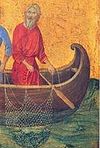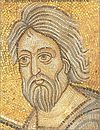

| Previous day | Next day |
| Old Style
November 30
|
Friday |
New Style
December 13
|
|
26th Week after Pentecost.
Tone 8.
Nativity Fast. |
Monastic rule: cooked food, no oil.
|
![]() Holy and All-Praised Apostle Andrew the First-Called (62).
Holy and All-Praised Apostle Andrew the First-Called (62).
St. Frumentius, archbishop of Abyssinia (380).
Sts. Peter I (5th c.) and Samuel I (5th-6th c.), catholicoses of Georgia. St. Vakhtang Gorgasali, king of Georgia (502). St. Tudwal, bishop in Wales and Brittany (6th c.). St. Andrew (Saguna), metropolitan of Transylvania (1873). St. Elias, schemamonk of Valaam and Verkhoturye (1900).
Thoughts for Each Day of the Year
According to the Daily Church Readings from the Word of God
By St. Theophan the Recluse

Friday. [Tit. 1:15-2:10; Luke 20:19-26]
Render therefore unto Caesar the things which be Caesar’s, and unto God the things which be God’s. This means that each gets what is his own. In our times, instead of “the things which be Caesar’s” we should say, “the things which are earthly.” Also, earthly things have their turn, while Godly things have theirs. But everyone has rushed toward earthly things alone, and they leave the Godly things behind. That is why Godly things not only are left out of their proper place—that is, the first priority—but are completely forgotten. A consequence of this as if unintentional forgetfulness is that the Godly is darkened over in one’s consciousness, and then both its content and foundation become unclear. From this come weakness of conviction and unsteadiness of faith; and then alienation from faith, and influence of the winds of various of teachings. Everyone goes down this path when they begin to be careless about Godly things; society takes this path when it begins to ignore what God requires of it. When Godly things are left in the background, then emancipation from Godly requirements begins to set into society, in the intellectual, moral and aesthetic sense. Secularization (serving the spirit of the time) occurs of politics, customs, entertainment, and then of education and all institutions. At the current time, people do not think, speak, write or even keep Godly things in mind—not in any of their undertakings. Is it surprising, given such a mood, that teachings contrary to the faith find access to society and that society is inclined toward total unbelief?
Articles
 The “Trier Sandal” of Apostle AndrewAnatoly KholodiukAccording to tradition, holy Empress Helen brought to Trier the sandal worn on the right foot of the Apostle Andrew the First-Called. |
 St. Vakhtang Gorgasali, King of GeorgiaThe holy and right-believing king Vakhtang I ascended the throne of Kartli at the age of fifteen. |









